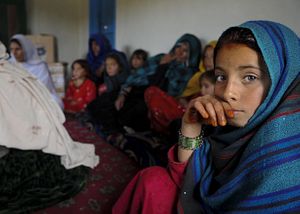The Afghan parliament has passed legislation that bans relatives of an accused person from testifying against them, a move that human rights groups say will legalize domestic violence in a country where “honor killings” and forced marriage are practiced.
Under the new law, which is awaiting President Hamid Karzai’s signature, victims such as Sahar Gul, a former child bride who was abused by her in-laws, and Sitara, whose nose was sliced off by her former husband, would not be able to testify against their attackers.
A change to a section of the criminal code can also prevent doctors, children, and defense lawyers from testifying in a case, according to The Independent.
“It is a travesty this is happening,” Manizha Naderi, director of the charity and campaign group Women for Afghan Women, told The Guardian. “It will make it impossible to prosecute cases of violence against women … The most vulnerable people won’t get justice now.”
Rights groups have condemned the bill and are calling for the international community to pressure President Hamid Karzai into vetoing it.
“Afghan President Hamid Karzai should refuse to sign a new criminal procedure code that would effectively deny women protection from domestic violence and forced or child marriage,” Human Rights Watch said in a statement.
Although Afghanistan faces problems of domestic violence, forced marriages, and so-called “honor killings” – homicides that usually target women accused of damaging their families’ “honor” – human rights groups have stated that the situation has improved in the last 10 years after the Taliban was pushed back.
Since the Taliban’s fall, restrictions on women’s access to education, work and health care have been lifted. Females were also granted the right to vote, hold office, and even become police officers and soldiers. The 2004 constitution guaranteed women equal rights – while a 2009 law made violence against women a crime.
However, deep-seated traditions are hard to uproot. Women in the public sphere face threats and harassment and the new laws that guarantee equal rights for women are difficult to implement, especially in rural areas where the Taliban forces still have control.
With the year-end deadline for the withdrawal of international forces looming, some human rights organizations have expressed concern that without the U.S. presence, Afghanistan will take a step backwards when it comes to equal rights for its women.

































